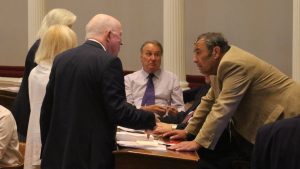MONTPELIER, Vt. — Gov. Phil Scott and lawmakers reached agreement on a budget and teacher health care deal that makes good on the promise of fiscal restraint in Vermont.
“With this proposal in place, the Legislature passed a budget today that – for the first time in recent memory – does not raise taxes and fees,” Scott said Wednesday in a statement following the single-day veto session.
“This agreement will save Vermont taxpayers millions of dollars and provides a path to achieve greater efficiency in the future,” he said.
After failing Wednesday morning to override Scott’s budget veto, lawmakers began preparing to debate compromise language introduced by leaders of each party.
The compromise will reduce payments from the Education Fund to local school districts by $13 million — the amount expected to be saved from switching to new health care plans. However, school districts and teachers will negotiate the employer-employee split on health care costs at the local level, as advocated by Progressives and majority Democrats.
It also sets restraints on what schools can spend on health care plans until their next contract in 2019. Each school’s 2017 healthcare spending will be assessed, and spending for the next year should not go up more than 5 percent, or they must draw the difference from their own budgets.
While few elected officials seemed happy with the deal, taxpayers have something to cheer about. The homestead property tax rate will go down by 2 cents from last year, and the nonresidential property tax rate will remain at its fiscal year 2017 level of $1.535 — yet 2 cents lower than the rate proposed in the tax bill in May.
The agreement also creates a commission to study the possibility of statewide health care negotiations for the future, a position advocated for by Scott and many Republicans.
The deal puts pressure on schools to negotiate successfully or run into budget trouble. Schools also can choose to deficit spend in order to comply with the new agreement, which a handful of legislators criticized.
“We have to somehow find savings in an already approved budget with an already approved contract,” state Rep. Heidi Scheuermann, R-Stowe, said. “So there have to be some savings elsewhere, probably in our programs or other things with our school.”
Rep. Barbara Murphy, I-Fairfax, told True North that the school districts in her area already achieved savings.
“We’ve had the 80/20 (premium costs share) in place. It’s something we’ve negotiated back in the past, and I know other districts have as well,” she said. “Other people are in the reverse; they’ve traded off raises to maintain their insurance.”
Throughout the session, lawmakers struggled both to grasp and explain the way the agreement works.
“Basically, we know that this plan is going to generate X-number of savings, and as long as we negotiate within 5 percent of that, we will get these dollars,” Minority Leader Don Turner, R-Milton, said. “The state then will claw that back. They will say to the districts, ‘We’re keeping this money because we know you are doing this,’ and the money will be kept in the education fund.”
Rep. Lawrence Cupoli, R-Rutland, said that it’s nearly too complicated to explain to his constituents.
“If I wasn’t on the Education Committee I don’t think I’d understand it, and there are parts that I still get confused about,” he said. “This is a very short-term fix, and then the commission will come in and give their recommendation.”
Rep. Robin Chesnut-Tangerman, P/D-Middletown Springs, speaking from the House floor, said he was unhappy at the way the executive and legislative branches failed to work properly.
“I cannot support this process,” he said. “I think we worked very hard to reach a reasonable solution, but I am adamantly opposed to the process that started this, introducing at the 11th hour a demand which effectively bypassed the committee process and the deliberative processes of this Legislature.”
No marijuana legalization for this year
As expected, pro-marijuana senators on Wednesday passed a bill that would legalize small amounts of pot possession and growing, only to have the measure die in the House when Republicans refused to suspend chamber rules to allow the bill come to the floor.
“I feel relieved,” Rep. Vicky Strong, R-Albany, told True North. “I don’t like a process where one or two legislators are working to push an agenda.”
Rep. David Ainsworth, R-Royalton, also liked the result.
“It was not discussed, and I think that was the appropriate thing for this year,” Ainsworth said. “We’ll see what happens another year. I’m sure it will be brought up again next session.”
Vermont adopts Paris Accord global warming goals as a nonbinding resolution
Lawmakers, nonetheless, passed a nonbinding resolution opposing the U.S. withdrawal from the Paris climate accord and praising the governor for joining the U.S. Climate Alliance, a growing group of local governments pledging to keep the goals of the climate treaty.
While most lawmakers spoke out in favor of the resolution, Rep. Douglas Gage, R-Rutland City, blasted the resolution as out of step with constituents.
“It makes a commitment on behalf of Vermonters without their input,” he said on the House floor. “It puts this question on the floor without going to a committee, without having due process. We are talking large, large amounts of money with great impacts on all sectors.”
Gage challenged the foundation of the argument behind the resolution.
“It is not a foregone conclusion that global warming is doing everything they are saying it is,” he said. “Many scientists say that the political status quo is forcing them to go along with it, and many of these scientists point to sunspots and natural cycles that have far more impact than anything that human beings have ever done.”
The measure passed the House by a 105-31 roll-call vote.
Michael Bielawski is a reporter for True North Reports. Send him news tips at bielawski82@yahoo.com and follow him on Twitter @TrueNorth82X.



